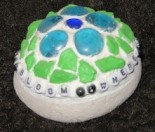When summer approaches it’s time to get into the garden, drag out those tools, get on the gumboots and do something productive. Kids absolutely love planting their own seeds and why not teach them that what they grow can become their own special medicine.
Pick a patch of soil and just go for it. Seeds are incredibly cheap and go a long way, and the beauty is most herbs are easy to grow and require little maintenance really. Herbs, apart from bringing beauty and a sense of wildness to your garden, can provide lots of health benefits and I have listed below a kind of first aid herb garden selection for you to make a start.
Thyme – (Thymus vulgaris) – The leaf has the strongest medicinal qualities. Infuse as a tea for a digestive tonic and for hangovers (that ones for the parents, not the kids). Add honey to use for convulsive coughs, colds and sore throats. Infuse in oil and apply to the forehead for headaches. Use the same oil as an antiseptic spray. Massaging with it can help circulation, cramping and it’s great for infections as an antimicrobial agent.
Feverfew – (Tanacetum parthenium) – Eat 3 to 5 fresh leaves every day to reduce migraine. Infuse the leaf and flower in oil and use as a massage oil to act as a sedative, appetite tonic and to relieve muscle spasms.
Rosemary – (Rosmarinus officinalis) – Use the leaf as a tea or infuse in oil to stimulate circulation. It can aid digestion of fat and is good for aching joints and rheumatic pain. Can be used as an antiseptic gargle or mouthwash.
Sage – (Salvia officinalis) – The leaf aids digestion and has antiseptic and antifungal properties. It can help during menopause as the herb has estrogenic qualities and can assist in cases of diarrhea. Sage tea and wine can be used as a nerve and blood tonic. The tea can reduce sweating and soothes coughs and colds.
Parsley – (Petroselinum crispum) – Chew the leaf raw to freshen breath and promote healthy skin. Infuse as a tea as a digestive tonic. Use as a poutice as an antiseptic for sprains, wounds and insect bites. The root can be used in a decoction as a mild laxative and for kidney troubles.
Mint – (Mentha x piperata) – Leaf make a tea or use fresh for digestion, flatulence, hiccups and flu. Sip the tea when cold for best results.
Coriander – (Coriandum sativum) – Use the seed medicinally chew or infuse as a tea for it’s sedative and digestive tonic qualities. Coriander is also a great herb to use for chelating heavy metals in the body.
Fennel – (Foeniculum vulgare) – Use the fennel seed great for colic, digestion, milk flow for lactating mums and useful in cases of constipation.
So there we go, most of these are everyday herbs that we use for culinary purposes only, and yet they have so many other values that we should be aware of. Now you know that, apart from them being delicious on salads, they work wonders for the body.
Enjoy the fruits of your hard work and have some great family fun in the process.






